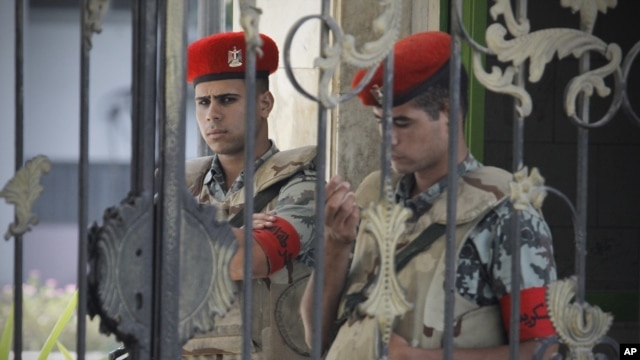
Egyptian soldiers stand guard outside the Maadi military hospital where former president Hosni Mubarak was transferred and is currently on life support, June 20, 2012.
Egyptian security sources say ousted president Hosni Mubarak is unconscious and on a respirator after being rushed from prison to a military hospital following a stroke.
Military officials said early Wednesday that Mubarak, who was taken to Maadi Hospital in southern Cairo, was "using artificial respiration."
Earlier reports by the state news agency MENA said Mubarak's doctors had declared the former leader "clinically dead," but the military said it was too early to make that designation.
Some Mubarak supporters gathered outside the hospital Wednesday, including Mahmoud Abdellah, who described the ousted leader as having a mixed legacy.
"We are here because of Mubarak," he said. "We are praying for him if he is still alive and if he is dead, we will pray for him for God's mercy. We still remember the good things that he has done beside the bad things."
But in Tahrir Square, a central point of the protests that drove the 84-year-old Mubarak from power last year, Ali Mohamed Ali was among Egyptians who looked to move on from the Mubarak era.
"Mubarak is no longer in our hearts," he said. "He has no value to us anymore. We need to focus on the present and future. What's been done is done, but may God fix his situation."
The square was mostly quiet early Wednesday, following protests Tuesday night that brought tens of thousands of people from across the political spectrum to speak out against a declaration by Egypt's ruling generals extending their grip on power.
Election complaints reviewed
Also Tuesday, Egypt's election commission said it was evaluating hundreds of complaints of irregularities in the runoff presidential election between the Muslim Brotherhood's Mohammed Morsi and former prime minister Ahmed Shafiq.
Both candidates claimed victory, but a public count of the ballots, confirmed by the official media, showed Mr. Morsi winning with 52 percent of the vote to Mr. Shafiq's 48 percent. Aides of the establishment-backed Shafiq disputed the claim.
Turnout was just over 50 percent of the roughly 50 million eligible voters. Election officials are expected to announce the official results on Thursday, but the losing candidate is likely to reject the outcome as fraudulent.
International campaign observers, including the U.S.-based Carter Center, said Tuesday they were denied sufficient access and accused the military leadership of hampering the transition to democracy.
The poll was Egypt's first freely contested presidential election.
Brotherhood challenges military
The powerful Brotherhood movement has vowed to challenge the military's recent moves restoring martial law, dismissing the Islamist-dominated parliament and curbing the powers of the incoming president.
A unilaterally declared interim constitution grants the generals and the courts final say over much domestic and foreign policy and the constitutional drafting process. It rules that no election can be held until a military-appointed panel writes a permanent constitution whose articles the generals can veto.
Despite the moves, the ruling Supreme Council of the Armed Forces vowed earlier this week to honor its promise to hand over power to Egypt's newly elected president by the end of the month.
The U.S. State Department has said the Obama administration will hold the SCAF to its promises for an "inclusive constitutional drafting process, the timely seating of a democratically elected parliament, and the swift, permanent transfer of power to a civilian government."
The U.S. has provided billions in military aid to Egypt over three decades of close relations. |
|
